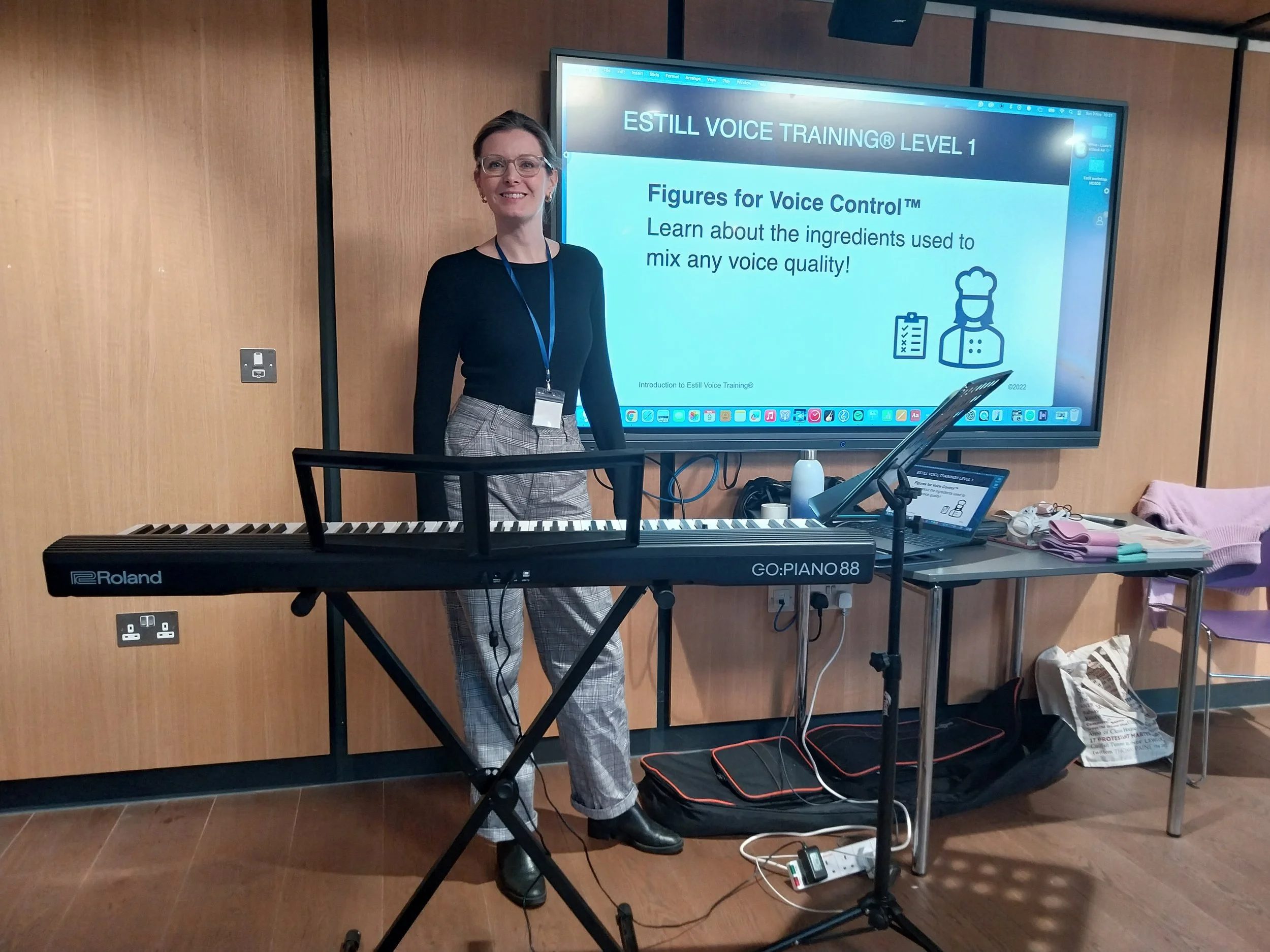
How long do I need to take singing lessons for?
How long do I need to have singing lessons for?
In this blog post we look at why awareness, having clear goals and having some guidance from an experienced teacher can best help to answer that question.

Estill Voice Training™ in Action: A Workshop Recap
Estill Voice Training™ at the Community Studio in the Canterbury Cathedral Precincts, November 2025, led by Laura Boon (Estill Master Trainer).
Read about the workshop from the perspective of one of the attendees.

What is Estill Voice Training®, and is it for me?
On Sunday 9th November, I’ll be running another full-day Intro to Estill Voice Training® workshop in Canterbury, and if you’ve ever wondered how your voice works, or how to help others use their voice more confidently, this day could be for you.
We’re going to be learning in the beautiful and central Community Studio behind the Cathedral Gift Shop. This one-day, in-person session is designed to offer a friendly, practical and engaging introduction to Estill Voice Training®, and how it can support you, whether you're a singer, a teacher, a choir leader, MD, actor - or simply curious about the voice.

Help! I’ve got stage fright!
Performance anxiety, a.k.a. stage fright, happens to performers the world over, and at all levels of experience, including international superstars like Andrea Bocelli and Adele.
But there ARE ways to help reduce its impact. Here are some of them…

Estill Voice Training - Introductory Workshop
On 10th June I ran an Introductory Workshop in Estill Voice Training in the heart of Canterbury. I was joined by a wonderful group of singers, teachers and artists who were so generous in sharing their voices with me! Here’s just a snippet of what they had to say…

How sleep affects the voice
To have a healthy voice, we need a healthy body. And to have a healthy body, one of the most important things we need is SLEEP. Most adults need 6-9 hours of sleep per night to be functioning healthily. If we get less than this, poor sleep can lead to an inability to focus, poor memory, mood instability, increased stress, inefficient voice use… all of which are unhelpful for singers…

What key should I sing it in?
It’s sometimes seen as a badge of honour to be able to sing songs in the original key, but in my opinion this is just silly. Why would you not want to make your singing both comfortable, enjoyable, and have it show you and your voice off to its best? So wherever possible, I always advocate for changing the key to suit your voice. How to find the best key for your voice…

4 ways to prepare for a performance
Putting work into developing your vocal coordination and technical abilities whether or not you have any performances lined up is a smart move. Then you'll be able to trust your instrument to technically manage the demands of the songs when those performance opportunities come up. What does this look like in reality?

8 Essentials of Vocal Health
Having a healthy voice isn’t just important for singers and professional voice users, it’s important for everyone! If you’ve ever had issues with your voice, you’ll have an idea of how much of an impact it can have on your daily life, your work, your ability to communicate to express yourself clearly, and even on your sense of identity.
As Erasmus told the world way back in the 1500s (and people with common sense have known ever since), prevention is better than cure. So here are some of the ways to look after your voice day to day, to keep it in great condition and serving you well.

5 easy ways to keep your vocal folds happy
Our vocal folds do such a lot for us, so it’s the least we can do to look after them and keep them happy. Here are 5 easy ways to do just that

Why tongue twisters are great for your voice
Tongue twisters can be used to warm up the voice and to provide targeted exercise for our articulators. They're fun to say, and to sing.

Tools and resources to help you learn to sing
As singers, we’re lucky that our instrument is both portable and free. With the exception of all the things we should be doing to take care of ourselves as a whole (eating well, sleeping well, staying hydrated, managing stress levels) it doesn’t require quarterly services or expensive upkeep. However, once we start thinking about voice training, it can benefit from a little investment. Here’s my list of some add-ons that I’ve found useful. Although none of these are essential to a healthy and efficient voice, they can all play a useful role when training it.

How to ad lib (for those who find it scary!)
Some singers find improvising very intuitive, but others find the prospect very daunting! If you’re in the latter camp, then this blog post is for you!

How to practise singing - Part 2
In part 1, we looked at why we should practise and the kind of things we might practice. Now we need to look at how to actually do the practising. Here are some options.

How to practise singing - Part 1
Practice, rehearsal, run-throughs, exercise - whatever you like to call it - when we want to make positive changes to our voices, it’s essential. It’s where the real change happens. Where our range extends, where our agility and flexibility improve, and where we gain vocal stamina. These days we’re all constantly bombarded with distractions in our lives, and so we want to make any time we do devote to practising our singing really count. Practising singing is so much more than just singing through your songs until you ‘get’ them. In this 2-part series, we’ll explore the why, what and how of practice as well as some common pitfalls.

How to warm up your voice
We all know we should warm up our voices before we sing - but how many of us do it religiously, every time? What about warming up for speaking? Here are a few things to think about.

How to memorise lyrics
For some of us, this is one of the hardest parts of learning to sing. Over the years I’ve worked out a few ways to help those lyrics go in… here are some I’ve found most helpful:

How to do SOVT exercises
What are SOVT exercises? SOVT stands for ‘semi-occluded vocal tract’ - a fancy way of saying that the air is partially blocked on its way out of your mouth. There are several different types of SOVT exercises, which all have different levels of air resistance, and different advantages and disadvantages. The benefits of this type of exercise are scientifically proven, so I encourage my students to build some into their day whenever and wherever they can. Here’s a handy breakdown of the what, when, and how of SOVT exercises.

5 things you should know about starting singing lessons
If you’re venturing into the singing studio for the first time, you may have some anxiety about singing in front of somebody new during the first lessons - don’t worry! It’s totally normal to take a little bit of time to feel settled and relaxed.

6 Ways You Can Practise Singing Silently
As much as we might love singing there are times when we need to be quiet, whether that’s because we are in a place where we can’t sing full volume (such as if it’s very late and you’ve got neighbours, a sleeping baby, or a housemate with a headache), we’re going about our daily lives in public (like in queue at the post office or on a train on the way to work) or we have a vocal health issue that needs vocal rest. In these kinds of circumstances, there are still several ways of practising singing without actually singing. Here are a few ideas for silent practice…
